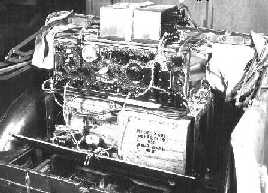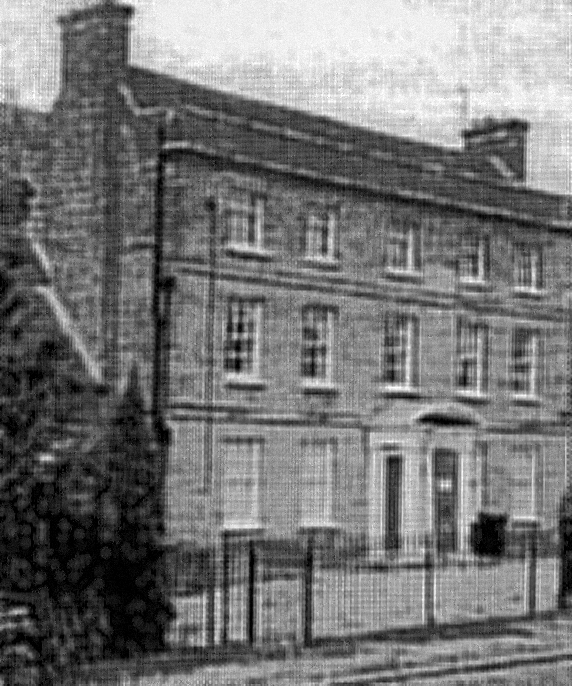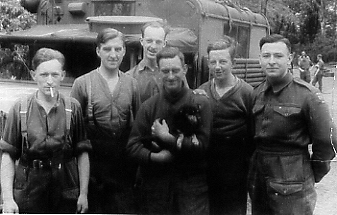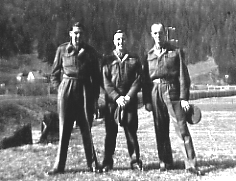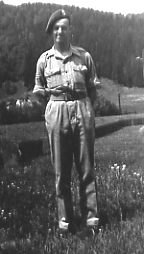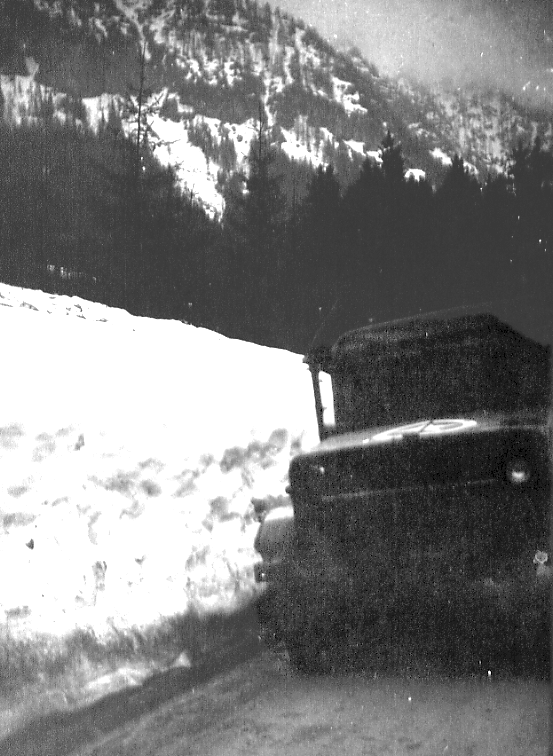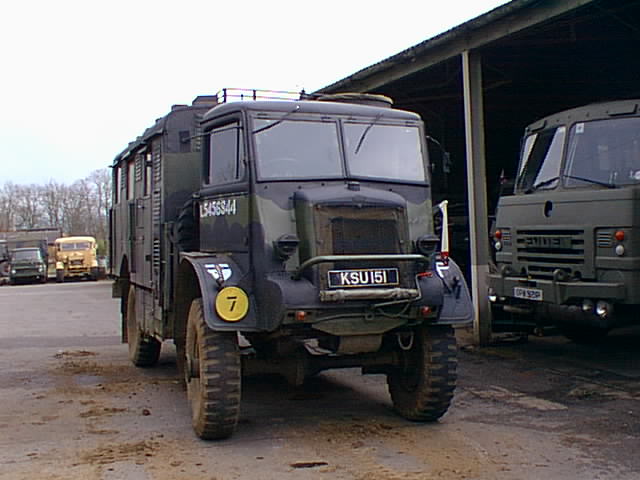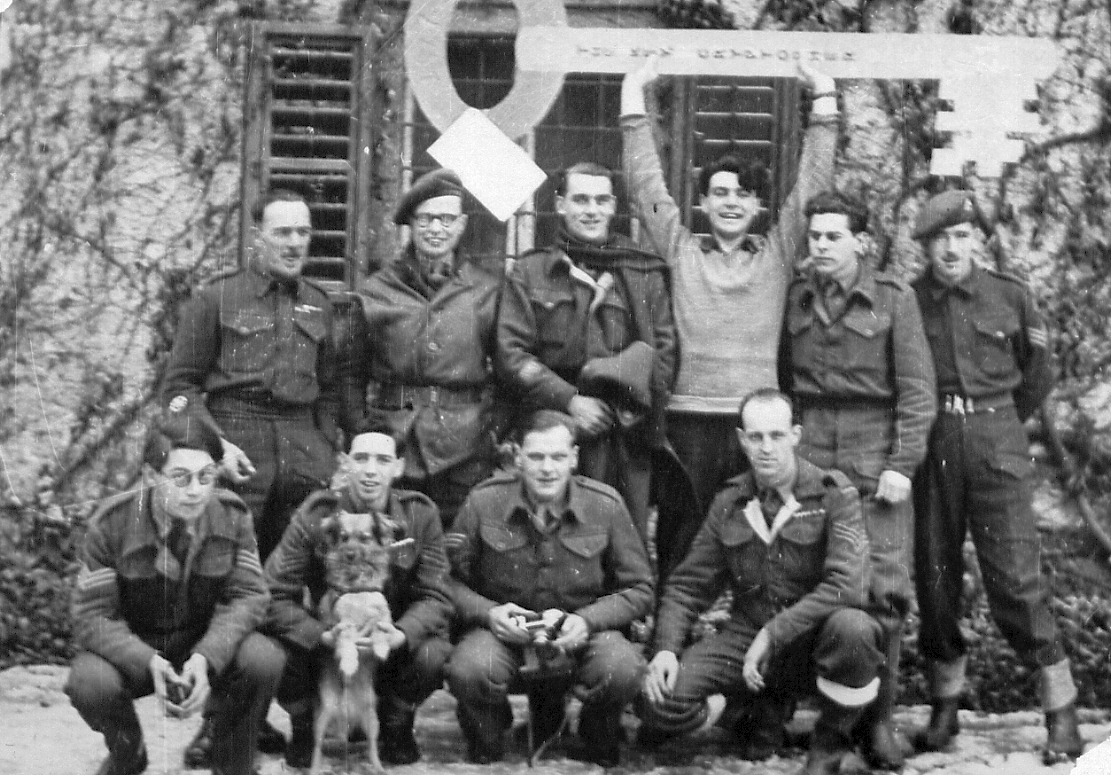|
THE GROWING UP YEARS CONTINUED |
||||||||||||||||||||||||||||||||||||||||||
|
On arrival at 3 Signal
Training Centre, Huddersfield, they all looked a motley bunch reaped from
all regiments and some from Signal Centres. Jim went before a Trade
Training Selection Board, and when asked what he would like to be, he
replied "a driver". But the army had different ideas, and he became an
operator wireless and line, and settled in Squad 176, 3 Operators Training
Battalion.
A week before Christmas 1942, he passed his E3 and received an extra three pence a day to add to his 3 shillings! That Christmas Day (his first in the army) he felt extremely miserable and on Boxing Day he was informed that along with Evans and Cordoray they were to be posted to Special Operators Training Battalion at Trowbridge. So the next morning with all their kit the three paraded at Huddersfield Railway Station along with 20 other men under a Corporal en route to Trowbridge. They were billeted in the New County Hall in 2 Company. There was nobody else in the building and Corporal Tonks of the Middlesex Yeomanry informed them that they would be on fatigues, packing up, as the Battalion was moving. "Where to?" they asked. It was a secret of course, but the civilian workers in the Town Hall told them they were going to the Isle of man!! New Years Eve was spent filling packing cases and then on a dismal January evening in 1943 three squads of ATS plus Jimmy and his friends along with instructors marched down to the railway station and boarded a special train in the blackout. Sometime early next morning, they were all ordered off the train, then instructed to unload the boxes and transfer them to a ship. They did not have a clue where they were, but from a member of the crew they discovered they were at Fleetwood, Lancashire. Safely aboard they then proceeded to Douglas on the Isle of Man. Their squad was No. 79 but already 76 squad had arrived as the advanced party. Their new home had the glorious title of Palace camp and was made up of a row of about 20 boarding houses which had been used previously as an internment camp for Axis civilians who had been transferred somewhere else. It took a good two weeks to get organised but the conditions were first class, especially after Huddersfield. They were all well overdue for some leave and were eventually given 9 days. But it was a bit of a hassle as they had to go in FSMO (Full Scale Marching Order) and take their rifle with them. That January morning they marched the 2 miles to the docks along the promenade, where a gale force wind was blowing and they passed by HMS Valkyrie an ASDEC training school. Jimmy did not arrive in Haverfordwest until about 36 hours later due to a bad crossing to Fleetwood (5 hours instead of the usual 4 hours) but he enjoyed the six days he had home. On the return to SOTB they began a six month course as Operator Special High Speed Morse reading, German army wireless procedures, map reading, E & M, Direction Finding an much more. Douglas was enjoyed as much as possible on their one pound a week pay. And towards the end of the course they had to learn the Kana code (Japanese Morse), which they found extremely difficult. At 1700 hours they used to march up to 5 Coy at Onchan Head, and in the Set Room monitor the 1800 hours Japanese Navy transmissions from Singapore to Tokyo. All good training they were told!
They passed out in early July and after leave they moved to the other end of the island to the Golf Links at Castletown. Two weeks later No.7 Special Wireless Section 'A' type mobile was formed from members of 76,79 and 80 Squad, about 90 operators in total. They then went to Oakhill Hotel (?) at Hampstead, NW London where by the end of September 1943 they were operationally monitoring German Army Groups. The main targets being the 3 Panzer Divisions that were stationed in the area around Paris. One of these, 12 Panzer had just come back from the Russian front after suffering huge casualties and had just been reformed. They went out on exercises to the Normandy and Cherbourg areas which were tracked by Jim and his merry men on their D/F. In February 1944 Jim now a Lance Corporal along with two signalmen and three drivers and their CO Major Beale set out for a field at the Old Mill, Bishops Waltham near Fareham in Hampshire. They erected Bell tents, a marquee for a mess room and stores. A tin hut for a cook house, ablutions, latrines etc. Then 3 wireless set wagons (affectionately known as Gin Palaces) arrived. these were located on a hill about a mile outside of Bishops Waltham which was a Civilian 'Y' Service site. Sets were installed as well as generators, 72ft masts and aerials erected and early April the Section moved down from Hampstead. Soon they were working the 3 watch system, 24 hours a day, sleeping in tents and working in the back of a 3 ton truck.
|
|||||||||||||||||||||||||||||||||||||||||
|
An ATS teleprinter section was stationed in the Old Mill House and as they worked at the civilian site and performed the same watches they used to come on board truck with Jimmy and his mates. During this time the build up to D-Day was apparent, every field in the area was full of tanks and armoured vehicles and equipment. The area was a "No Go" zone and all mail was censored and all leave cancelled. D-Day came and went and it found them still covering the beach head, especially 12 Panzer who were right in the way. Two weeks after D-Day a rocket (Doodlebug or Buzz Bomb) was hit by anti-aircraft fire and fell on them. Jims watch suffered the most casualties, but replacements came from 10 SW Section and they carried on as if nothing had happened. They were then moved to Rustington as part of 21st Army Group and covered 1SW as they embarked for Normandy. They were then put on 24 hours standby to go, and were moved to Broadstairs to await further orders. And soon they were on their way to Tilbury Docks. The transport was loaded overnight and the next day they embarked on the "Samark" a liberty boat. Besides 7SW Section was a 25 pounder artillery battery,Royal Engineers, Dog Platoon (Mine Lifting) and an RAF weather section. That night they dropped anchor off of Southend Pier and by morning under a smoke screen and destroyer escort slipped past the German guns at Cape Grisnez. After three days of travelling they arrived at Arromanches and the Mulberry Floating Harbour. They had to descend nets to the launches which ferried them ashore and the first night was spent in a transit camp while the transport was winched ashore. The tents in the transit camp were pitched in a sea of mud but morale was high, they had arrived!
Systematically they advanced through France and into Belgium to Brussels and then were switched from 21st Army Group to 2nd Army. Jim was by this time in command of a D/F loop with 3 operators and 2 drivers, a 15cwt Bedford truck to tow the D/F trailer and a 15cwt Guy wireless truck. Everybody pulled their weight and they all got on together. They
crossed the Dutch/German border at Sittard on 3rd December 1944 with the 5th Batt. Coldstream Guards (Guards Armd Div). And after Christmas returned to
the Ardennes, but by this time the Germans were in full retreat. They then
went back to Holland on the River Maas with 11th Armoured Division.
The Germans held the opposite bank of the river, but things were quiet.
One night, tanks of the Fife and Forfar Yeomanry could be heard advancing
and next morning these were replaced by the Americans.
Jim had to go to a meeting with the CO at the section and was informed that he was to be attached to 116 SW Section. who in turn had been assigned to the US 9th Army which was under the command of Montgomery. They crossed the river and carried on up to the Rhine. It was another two weeks though before they were able to cross and then it was all go until they met with the Russians on the Elbe.. Then came VE Day and they could not believe it was all over. The next day Jim received a coded message to meet a D/R at a certain map reference at 1600 hours. It was a long haul across country but then finally arrived at a town called Lunenburg. They began to wonder if the war was really over as there were hundreds of German soldiers, some still armed, walking about aimlessly. The D/R arrived and guided them to a farm where 106 SW Section were. Captain Scott their CO greeted Jim with th news that he was promoted Paid Acting Corporal and posted to the Far East.
After a week Jim and Frank Gigg, from Taunton, found
themselves on the River Weser at General Scharnhorst's mansion, though
they were under canvas! There were about 100 operator specials to go home
for the Far East. They all left for Hanover Station (or what was left of
it) to travel to Zeebrugge a journey which would today take a few hours
but at that time took three days and found themselves boarding a tank
landing craft which took them up the Thames to Tilbury. They then found
themselves at Albury Hall, 7 miles outside Bishops Stortford in
Hertfordshire. Immediately 28 days leave was granted (14 days discharge
and 14 days embarkation) and on their return found the number of Operator
Specials had doubled to 200 including some from Italy and the rest new men
from the depot. They had three weeks to get up to speed on Kana Code
(Japanese Morse) but everybody achieved it in two weeks and morale was
high. They were then put on 24 hour standby when suddenly VJ Day was
announced and they were stood down. For the next two or three weeks they
set out working on the land. Pea picking, spud digging, and in the
greenhouses picking tomatoes with the Land Girls which they seemed to
enjoy!! But by now they were all fed up and on works parade one lunchtime
the CSM said to Jim,
He had no trouble getting volunteers and all the footballers wanted to go. Those chosen were posted to Harpenden which was the home of 1SW Group for years, and they were employed taking down masts and handing in stores to Woolwich for scrapping under lease lend. Then it was down to Dover and across to Ostende and on a train for Minden. As there was a surplus of Corporals Jim was told sit on a set as an operator which suited him down to the ground. The RSM took a disliking to him though as he was a conscript and not like the rest of the Cpls who were all regulars. They wanted a corporal at 121 Section 1 Corps at Iserlohn(?) on the Ruhr so he got the job. This in fact turned out to be a cushy little number and a good crowd of officers and men. Then out of the blue they were recalled to Minden and disbanded. That same day the Orderly Corporal told Jim to go and see the Adjutant. He could sense the RSM beaming. The Adjutant told him "Tito's playing up and we have to send a mobile section Austria. attached to 3 Wireless Company. 120 Section is being formed today and you are promoted to L/Sgt in charge of the operators!! So the very next day in February 1946 they set out across Germany and Austria to find 3 Wireless Company at Schloss Franberg, Frohn Letten on the Hungarian/Yugoslav border in the valley between Bruk and Graz. They took up residence in a paper factory and it was decided that the operators would work in 3 Coy set room to familiarise themselves with the Tito Army.
By May demob was well under way and a lot of 3 Coy men
who were also 8th Army veterans went on demob, so 120 Section was disbanded
and merged into 3 Coy. Jim went to Vienna for six weeks with three
corporals and three Lance corporals to sort out the Russian army units and
had trips down to Italy to the D/F Adcock sites at Mestry (Venice) and a
little unknown fishing village called Rimini. All went according to
plan until December 1946 when the Commanding Officer, Major Mike Spearing
went home on demob. The new CO came from 8th Army Signals at Klagenfurt, he
was a post office reserve officer and had reached the rank of Colonel and
decided to sign on for 9 years. But what he had not realised was that
officers coming back out of Prisoner of War camps were senior to him on
the promotion register. He was a Lt Col at 8th Army Sigs and came as a
Major. He knew nothing about the "Y" service and was full of "bull", but
the Operators Specials crossing off the days and weeks on their demob
charts were having nothing of this and there was a period of 'Sun Spots' -
nobody heard any signals!!
The Intelligence Corps did not think much of this neither did UK HQ and as Jim was the only conscript, he had nothing to lose so acted as a mediator and despite being threatened with a Court Martial managed to reach a solution which satisfied both sides! The Regulars. the CSM, a Sgt and two corporals were posted to Kalegenfurt. Christmas that year was not a happy one the weather was cold and snow up to about 6ft deep the nights always well below freezing. Rations were minimal and the locals were worse off than the Brits so they could not supplement them. New Years Eve a dance was organised in the village. One of the lads before going out put an extra log on the open fire in their room in the Schloss, which fell out and set the whole place on fire, burning out the roof, Fortunately the watch on duty rescued all the sets and equipment and nothing except the building was lost. Jim ended up with a stay in hospital in Graz suffering from Pneumonia. They carried on using the canteen as a set room and those from the mansion moved into huts. There was a buffer line between 2 Wireless Coy at Sarafan in Palestine relaying their information to the UK. Because of this all senior NCO's were deferred month by month from demob. Five of the group ended up doing three months extra service!! By this time they had been designated as 12 Wireless Squadron and all the bull of the peacetime army was beginning to creep back in. The CO asked Jim if he would sign on as they had nobody to replace him and he said if he was made a substantive Sgt instead of a war Sub he would sign on, but his application was turned down by records so he ended up as a civilian again at the end of June 1947. He had 12 weeks leave due to his length of service but before it was finished he was at No8 District Police training School at Brycethen in the Ogmore Valley!! Police Constable P57 Pembrokeshire Police was now on duty!! But sadly that is another chapter in his life story...................
|
||||||||||||||||||||||||||||||||||||||||||

